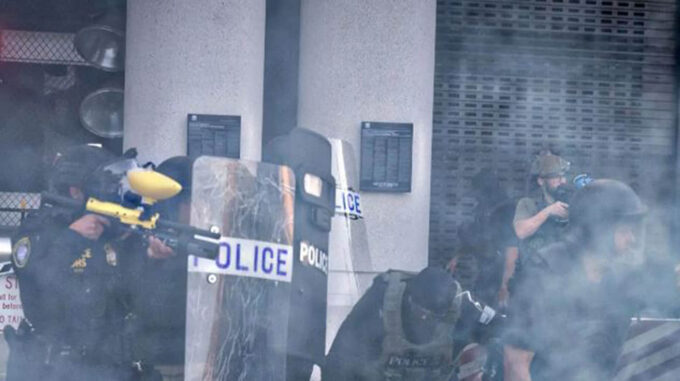Here is the translation of your text into English:

In Los Angeles, the Ukrainian and global communities were shocked by the news of the sudden deployment of the U.S. National Guard military forces in the city. This decision, made by President Donald Trump, sparked fierce confrontation between the federal government and the California state authorities. The move, which gained resonance amid escalating internal protests and regional tensions, became one of the most high-profile political events in recent months, highlighting the severity of the conflict between federal and regional authorities and raising questions about the limits of presidential powers. According to reports from international media outlets, including Bloomberg and CNN, military units of the National Guard were dispatched to Los Angeles on Sunday. This occurred immediately after two days of large-scale protests triggered by widespread immigration raids and caused by rising tensions in the region. The order for deployment involved at least two thousand soldiers, with their presence expected to last approximately sixty days or, in case of changing circumstances, until a separate decision is made by the country’s defense minister. Donald Trump himself, heading to Camp David on Sunday, firmly stated that, citing the federalization of the situation, comprehensive support would soon be provided. “We will deploy troops everywhere, we will not allow this to happen again in our country,” he emphasized at a meeting with journalists, hinting at the recent disturbances in Los Angeles. The president also highlighted that the situation that arose in the city on Saturday is classified as “rioting” and requires decisive action from the federal authorities. Meanwhile, California Governor Gavin Newsom, who refused to coordinate with the Trump administration regarding the deployment of National Guard forces, sharply condemned this move, calling it an overreach of authority and blatant interference in the state's internal affairs. In his video address, he accused the federal government of creating chaos and inciting escalation of the conflict. “The federal government is sowing chaos to justify escalation. This is irresponsible behavior for a country that aims for civilized institutions and resolving the situation responsibly,” he noted on social media. Local and state authorities stated their unwavering support for maintaining order. The National Guard leadership, in official statements, emphasized that the primary task of the military is ensuring safety and protecting federal property and personnel. Only they, in the military’s view, are competent to act in this complex situation and to restore order in a city with millions of residents. On Sunday, Governor Newsom sent an open letter to Defense Secretary Pino Gagssett (note: the name may need verification or correction) urging him to withdraw the decision to deploy troops in California cities. The document underscores that state authorities have the best understanding of the situation and that their resources should remain the main means of response. “Decisions to involve the National Guard without proper consultation and preparation could trigger even greater escalation of the conflict, endangering residents’ safety and spreading instability in the region,” the letter states. The governor added that the situation has significantly worsened after federal intervention and accused Trump of creating artificial tension. “We never had problems until federal institutions intervened. This entire conflict is the result of political games,” he concluded in his statement. This commentary underscores the deep dissatisfaction of local authorities, who see in the decision an attempt to centralize control and use it for political purposes. Analysis of the situation indicates that the deployment of the military in Los Angeles has become not only another episode in the internal power struggle, but also a vivid manifestation of the crisis in the American security management system. The high level of tension and confrontation between different branches of government raises doubts about the ability to find a common solution that ensures citizen safety and reduces political conflicts. The international community is watching to see what consequences this conflict will have for the internal stability of the United States and its global image. It remains unclear how the situation will unfold further, but this trend of increasing tension within one of the world's most powerful governments is evident.

